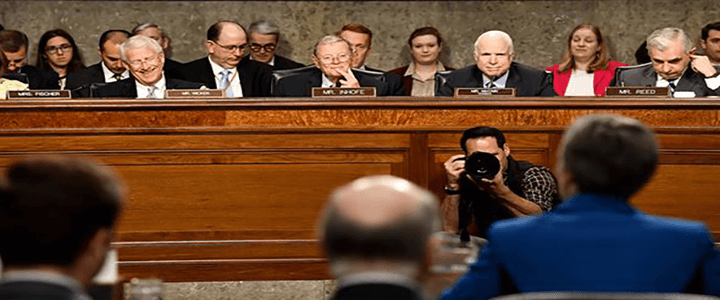Security clearance reform is not a new topic. But with the personnel security program recently placed back on the Government Accountability Office (GAO) high risk list, the issues with security clearance delays and a 710,000 case backlog are drawing increased scrutiny.
Legislators were quick to point out the problems in a Senate Intelligence Community hearing earlier this week. Pinpointing solutions was a little more difficult.
“The government’s process for issuing clearances is largely unchanged from when it was established in 1947, and the net result is a growing backlog of investigations, and inefficiencies,” noted Senator Richard Burr, chairman of the Senate Intelligence Committee. He noted the need to consider new technologies, create real-time awareness of employee behavior, and establish efficiencies that will make the process better for the government, contractors, and potential candidates.
“We can all agree, the clearance process should be demanding on candidates…but clearly the current system is not optimal, and we must do better,” noted Burr.
“To complete, globally, economically and militarily, we must do better,” echoed Senator Mark Warner, vice chairman of the Senate Intelligence Committee.
The committee split its Wednesday hearing into parts, hearing first from the GAO and industry representatives, and then from the agency heads responsible for background investigations. The GAO noted the downward spiral in security clearance processing times which led to the program’s placement on the high risk list. Security clearance performance relative to timelines has never been stellar – 73 percent of agencies did not meet timeliness objectives in 2012. Currently, however, meeting the timeliness guidelines seems to be impossible. The GAO noted 98 percent of agencies were unable to meet timeliness objectives in 2016.
“The backlog of 700,000 pending cases is our industry’s number one priority,” said Jane Chappell, vice president of Global Intelligence Solutions (GIS), Raytheon. “Given the challenges we face in finding qualified, cleared talent, to meet the mission that we have, we consider it a national security issue, and a government issue. Top professionals are in high demand across the nation. They do not have to wait more than a year to get a job.”
Industry representatives noted how personnel shortages are contributing to national security risks – as positions go unfilled and mission performance is compromised.
“Since the end of 2014, we estimate that approximately 10,000 positions required from the contractor community in support of the intelligence community have gone unfilled due to these delays,” testified Kevin Phillips, president and CEO of ManTech International Corporation.
Industry has been warning government for the past several years that clearance processing delays have real costs for contractors – reflected in their bottom lines and ultimately in the costs they pass along to the government. The price is both tangible and intangible.
“What the metrics fail to capture are the real world impact of the backlog is the new careers put on hold, top talent lost to non-defense industries and programs that provide critical warfighter capabilities facing delay and cost increases,” testified Raytheon’s Chappell. “The delays also come with a real world price tag.”
The issues with finding and retaining personnel aren’t just due to the issues with attracting entry-level and new talent for government careers. Industry representatives noted reciprocity continues to be one of the largest barriers to effectively putting employees to work, and adds unnecessarily to the backlog. While government agencies are generally supposed to accept a successfully adjudicated security clearance investigation, many agencies continue to require a new investigation, or a separate suitability investigation which often lingers for months just as an investigation does.
“How can it be that you’re cleared and accepted in one part of the government, and not cleared and accepted in the other parts of the government?’” said David Berteau president and CEO of the Professional Services Council (PSC). “There are 23 agencies, but the problem extends beyond that.” He noted the 12 different adjudicating offices that exist within the Department of Homeland Security alone. The broken suitability process within DHS was the topic of another congressional hearing, with Berteau also testifying to the issues of security clearance reciprocity creating redundancy and delays – just within a single agency of government.
“One universally accepted and enforced standard across government is needed,” concurred ManTech’s Phillips.
Industry panelists largely concurred on their recommendations to the Senate Intelligence Committee for improving the security clearance process:
- Create portability and mobility for security clearances across the government.
- Reinstate timelines and facilitate better information sharing between the government and contractor community.
- Institute continuous evaluation to reduce some of the periodic reinvestigations workload and decrease the size of the backlog.
- Prioritize cases with the highest mission impact and risk to national security.
- Ensure adequate funding for background investigations processing and personnel security programs.
Several senators questioned the panel on the threat of insider threats, and what steps contractors are taking to prevent the next Edward Snowden or Harold Martin.
Industry emphasized they are compliant with new measures taken by federal agencies such as the NSA, but are also taking their own steps to monitor employee activity on work networks and increase communication between program managers, government representatives, and off site security and human resources offices. These efforts don’t and shouldn’t constitute additional time in the onboarding process with government agencies.
“Slow security does not constitute good security,” emphasized ManTech’s Phillips. “Industry is committed to taking the action to hire trustworthy individuals, and to help protect the nation from outside threats.”




